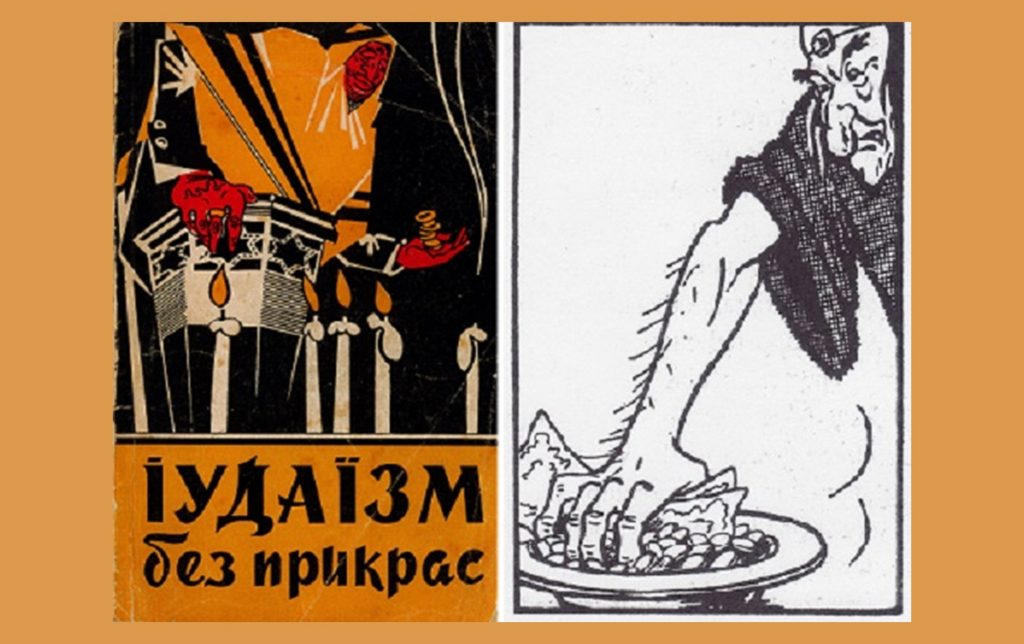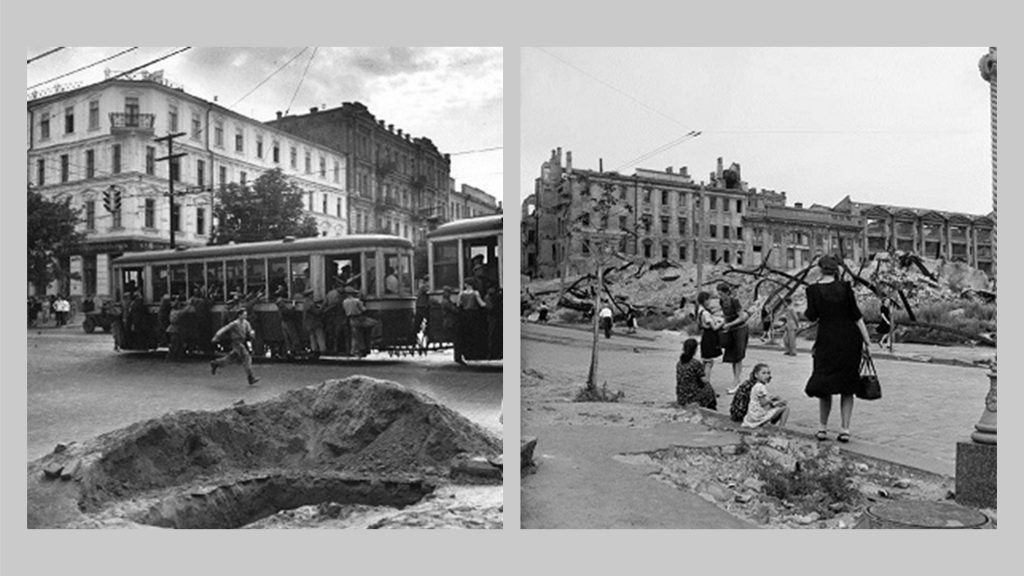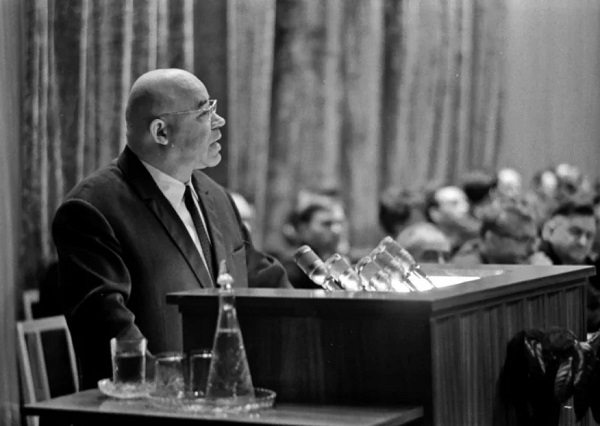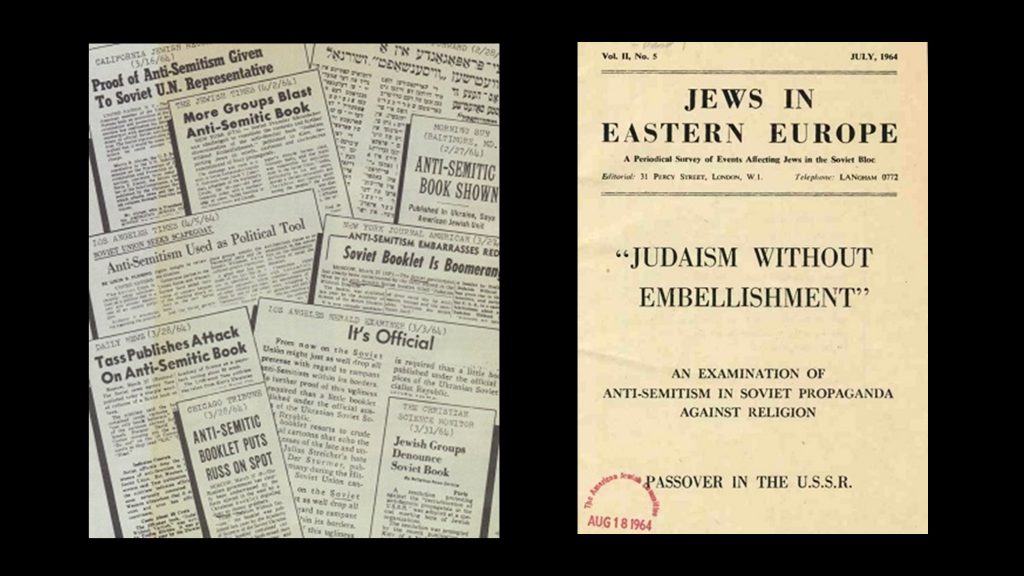Honored antisemite: How Trofim Kichko became the star of anti-Zionism

In the final decades of the Soviet era, hundreds of anti-Zionist books and brochures were published in millions of copies. Many authors secured themselves a steady income through their critique of “Jewish bourgeois nationalism.” Yet, one of the classics of this genre stands apart. In the 1960s his name was known far beyond the borders of the Ukrainian SSR: Trofim Korneevich Kichko. Not every party propagandist’s works were analyzed in the pages of The New York Times or were the subject of discussions at the United Nations. Not every anti-Zionist brochure was reported to Khrushchev personally. Only the odious author of Judaism without Embellishment was deemed worthy of being critiqued by Soviet ideologues, who disavowed the epochal work of this prominent antisemite.
We discussed the Kichko phenomenon and the international scandals provoked by the unflagging efforts of this Judeophobe with the historian and archivist Mikhail Mitsel, author of the book The Jews of Ukraine in 1943–1953. His latest book, [recently] issued by the Kyiv-based Dukh i Litera Publishers, contains a chapter devoted to prominent antisemites, including Trofim Kichko.
Trofim Kichko became a world-renowned (no exaggeration) anti-Zionist late in life, but what is known about his life before the late 1950s?
We can judge from a certificate dated 1948, issued to one T. K. Kichko, a teacher of the fundamentals of Marxism-Leninism at the Kyiv Technological Institute, as well as from a 1954 questionnaire that includes a biography of our hero:
Member of the CPSU since 1928 [Kichko was born in 1905—Ed.], higher education, specialty: pedagogue. Before the war, worked at the Kyiv Oblast Directorate of the Militia [...] was expelled from the AUCP(B) and arrested by the MGB organs [in fact, by the NKVD—Ed.].
He was held in custody for a year, then released for lack of evidence. From September 1941 to March 1944 he lived in German-occupied territory. He was imprisoned in a camp in Kyiv, from which he was released on 18 October 1941 under the surname of Samsonov. He took part in clandestine anti-fascist activities during the occupation of Vinnytsia.
In 1948 he was expelled from the AUCP(B) “for improper conduct during his sojourn in the occupied territory.” At the time he was being investigated by the party he was working as a senior lecturer, teaching the fundamentals of Marxism-Leninism at the Kyiv Technological Institute of the Ministry of Light Industry. In September 1950 he obtained employment as a lecturer at the Kyiv oblast lecture bureau.
He was reinstated as a member of the CPSU by a decision of the Central Committee of the Communist Party of Ukraine dated 29 September 1954.
The party propagandist and lecturer on Marxism-Leninism was a fascist collaborator?
His collaborationism has not been corroborated by documents accessible to this author. Kichko’s problems were caused by the competition between two conflicting groups of underground activists and the interference in this showdown on the part of the Vinnytsia oblast committee of the CPU. However, in 1948 the formal pretext was something quite different: He was expelled for alleged “propaganda of bourgeois-nationalist ideology” during the course of his lectures on the “Nationalist Essence of the Hrushevsky School.”

In the summer of 1952, the Lviv-based journal Zhovten′ [October] published a novel about the Vinnytsia underground by the famous partisan commander Dmitry Medvedev, one of whose characters was an underground member named Kvitko (a prototype of Kichko). The novel was criticized, Medvedev was accused of falsification, and Kvitko/Kichko was exposed as being practically an accomplice of the Nazis. We must give Medvedev credit for successfully demanding a review of Kichko’s file by the CC CPU and his reinstatement in the party. This marked the end of Kichko’s problems.
After which he began to be actively interested in the critique of Judaism and to give lectures on this topic.
Precisely. In 1957 Kichko’s brochure The Jewish Religion: Its Origins and Essence was published. The New York Times responded to the book with a devastating article, and United Press International circulated an article entitled “A stream of abuse against Judaism is pouring out of Ukraine.”
And so, one of the first to get a feel for the circumstances, Kichko became a leading critic of Judaism (and later of Zionism) not only in Soviet Ukraine. The most fruitful period for the antisemite was from 1957 to 1963, when his “works” came out practically every year. In 1962 he defended his dissertation “Contemporary Judaism and Its Reactionary Role,” obtaining the degree of Candidate of Philosophical Sciences.
In 1963 his book Judaism without Embellishment comes out, and for a long time, it remains a symbol of Soviet antisemitism. Why, in fact?
At first glance, this book differed little from other, similar publications, but its obsession went beyond the limits permissible in the USSR. Even Western communist parties were outraged by the illustrations of the artist Savchenko, which are reminiscent of the drawings that appeared in the Nazi newspaper Der Stürmer. It was these illustrations that led critics to do a close reading of the book, whose blurbs promised scandalous exposés. “The author exposes the real essence of Judaism, one of the oldest world religions, which has absorbed [...] everything that is most reactionary and anti-human from the writings of contemporary religions.”
In Kichko’s interpretation, myths from the distant past are fancifully linked with the invective of Soviet anti-Zionist propaganda:
“The Talmud is imbued with contempt for labor and for the working people, commoners. The Talmud has a particularly negative attitude to peasant labor [p. 40]. One of the commandments of Judaism is ‘Thou shalt not steal.’ However, as the Choshen Mishpat states, only from your neighbors must you not steal [p. 92]. Jewish ethics does not condemn such dishonorable acts as hypocrisy and bribery” [p. 93).
The author employed a broad range of ridiculous fabrications about the life of Ukraine’s Jewish communities, which were culled from the many anti-religious articles that were published during the campaign to close down synagogues (1956–1962):
“Speculation in matzo and pork; theft, deception, debauchery—this is the true face of the many ringleaders of the synagogue. Artful dodgers of religion are turning synagogues into their own feeding troughs, they manage the donations of believers, profiting from this.”

Kichko’s explicit fantasies knew no bounds:
“…individual servants of Judaism continue to echo the enemies of laboring Jews: the Zionists. Thus, in 1945 the Zionists, together with rabbis, with the support of representatives of the Joint Committee, launched frenzied, anti-Soviet agitation in our country, once again calling on Jews to immigrate to Palestine, under the rule of English colonizers.”
It would appear that Kichko had a good idea of such senseless campaigns, for in 1948 he himself was accused by the propaganda department of the Kyiv city party committee for having “quoted at length from the utterances of despicable enemies of the people,” “promoted the views of Hrushevsky, the enemy of the Ukrainian people and agent of German fascism, and completely smeared the Communist Party’s struggle against Ukrainian bourgeois nationalism.” It is also difficult to imagine that he had forgotten the attacks against him that had appeared in the pages of newspapers in January and February 1953. Nevertheless, Kichko, without any vacillation, wielded the cliché of the time, the “Doctors’ Plot,” citing publications dated February 1953, which the Soviet authorities later, in the 1960s, preferred not to recall.
When did Kichko’s book attract the attention of the international community?
On 6 March 1964 Morris Abram, the U.S. representative to the United Nations Sub-Commission on the Prevention of Discrimination and Protection of Minorities, wrote a letter to the Soviet representative Boris Ivanov. In addition to condemning the brochure, Abram posed a number of rhetorical questions about the book’s compliance with the text of the Constitution and the Criminal Code.
On 24 March 1964 Luka Palamarchuk, Minister of Foreign Affairs of the Ukrainian SSR, informed Petro Shelest, First Secretary of the CC CPU, about the UN’s negative reaction to Judaism without Embellishment. The Israeli Embassy sent copies of several caricatures from the book to the diplomatic missions of all the member states of the UN, emphasizing in particular that the brochure, featuring blatantly antisemitic content, was published in Kyiv by the Academy of Sciences of the Ukrainian SSR. In addition, the head of the Israeli delegation delivered a speech at the 22nd session of the UN Human Rights Council, in which he talked “about the policy of antisemitism in a ‘certain country.” A wave of protests erupted in the West, and the condemnation of Kichko’s book by the leaders of the communist parties of France, the U.S., Italy, and Great Britain forced the Soviet ideological machine to subject the author to a dose of criticism.

The situation was viewed from a different angle by Petro Shelest, First Secretary of the CC CPU. His diary entries under 21–31 March 1964 include the following paragraph:
“Ilichev, the secretary of the CC, called me from Moscow and demanded that I deal with the book issued by Politizdat of Ukraine. The book is entitled Judaism without Embellishment, the author is Kichko. Ilichev warned me that the question would be sorted out at the Secretariat of the CC [...] and that the contents of this book have been transmitted to Khrushchev. I myself [...] did not find anything reprehensible or seditious in it. Why can all religions be criticized, except for the Jewish one and the activities of Zionists? Well, then, let’s provide an ‘explanation.’”
Obviously, following Shelest’s instruction, people “providing explanations” were quickly found. On 26 March 1964 the newspaper Radians′ka kul′tura [Soviet Culture] publishes a lengthy review by B. Lobovyk and K. Yampolsky, in which the authors, “basing themselves on historical facts and the Leninist position about two nations in each nation,” scrupulously listed all the shortcomings of Kichko’s text. On 27 March the TASS and Novosti agencies published critical information, and a week later Pravda and Izvestiia put an end to the discussion. Pravda pointed out the following:
“The erroneous statements contained in the pamphlet contradict the party’s Leninist policy on religious and national matters and only provide fodder for the anti-Soviet insinuations of our ideological opponents, who are trying at all costs to create the so-called ‘Jewish question.’”
After the book was officially condemned in the USSR, L. Kiza, the Permanent Representative of the Ukrainian SSR to the UN, replied to the questions posed by Paul Novick, editor of the New York daily Morgen Freiheit [Morning Freedom]. Kiza said: “The errors made in the brochure Judaism without Embellishment do not reflect either our ideology or policies, or the mood of the Soviet people. In fact, there is no antisemitism either in Ukraine or the entire Soviet Union.”
You would think that after such a public pillorying, the irrepressible anti-Zionist would have kept quiet for a long time.
He did stay quiet for a few years, but the Six-Day War in the summer of 1967 summoned to arms all the proven critics of Judaism, Zionism, and Israel. On 4 October 1967, the republican newspaper Komsomol′skoe znamia [The Komsomol Banner] publishes Kichko’s article “Zionism is the tool of imperialism.” The following year, in 1968, Kichko was fully rehabilitated, as attested by the announcement in Pravda Ukraїny stating that Comrade Kichko, the chairman of the scholarly and methodological council of the Znanie Society, had been awarded an honorary diploma by the Presidium of the Supreme Soviet of the Ukrainian SSR for his achievements in the sphere of atheistic propaganda. That same year the Znanie Society publishes Kichko’s brochure Iudaїzm і sionizm, and even publishes its English-language version under the title Judaism and Zionism. On 1 December 1968, the Warsaw-based weekly Prawo i Życie (Law and Life] publishes a laudatory review of this book and recapitulates its contents, making it part of a noisy “anti-Zionist” campaign in Poland.

On 27 August 1968, after several years of silence surrounding Judaism without Embellishment, the newspaper Molod′ Ukraїny (Youth of Ukraine) publishes a list of recommended literature on the anti-religious topic, which includes Kichko’s famous text. In late May 1970 Kichko delivers a lecture in Ivano-Frankivsk sinisterly entitled “Judaic-Zionist Nationalism—The Ally of Neo-Fascism.”
His next “achievement” was published in 1972; this was a brochure entitled Zionism Is the Enemy of Youth. The scholar, encyclopedia editor, and journalist Geoffrey Wigoder responded to it with an article entitled “Soviet Antisemitism Has Gained ‘Respectability,’” noting that the style of Kichko’s antisemitic writings in his new works had reached a certain level of perfection. Wigoder calls the new brochure a blend of ignorance and deliberate lies. For example, Kichko writes that 200,000 Jewish children attended schools in Birobidzhan (even though the 1959 census reported that there were only 14,000 Jews living in the Jewish Autonomous Oblast). He also claims that the Torah calls for the killing of young people, both Jews and Gentiles.
Trofim Kichko was a true soldier of the party. He even managed to link the detested Zionists to the Maoists, who were no less hated in Moscow at the time.
Yes, Kichko’s article “The Sinister Alliance: What Unites the Maoists and the Zionists” was published in May 1975 in Literaturna Ukraїna (Literary Ukraine). From it, the reader could learn that “both Maoist policies in China and Zionist policies in Israel have led the [two] countries into a political and economic dead end, the way out of which the leaders of Israel and China see in war.” According to Kichko, “dreaming of establishing world domination, the Zionists long ago began to search for commonality with the Chinese.”
As far as I understand, Kichko’s reputation as a Candidate of Philosophical Sciences in intellectual circles was adequate.
Naturally, even though it was weakened by rumors about his “collaboration with the Germans,” which circulated among his contemporaries. For example, here is how Seva Novgorodtsev, the famous BBC rock music presenter, describes the reaction of the writer Viktor Nekrasov: “My acquaintance with Viktor Platonovich began from our correspondence. A vile little book by one Kichko, entitled Judaism without Embellishment, was published in Kyiv. I was getting ready to write a response to this concoction, and I asked Nekrasov in writing to find out who this Kichko is. The writer’s reply was unparalleled. ‘It’s not worth getting your hands dirty,’ Viktor Platonovich wrote. ‘During the occupation years, this guy was the director of the Vinnytsia cinema under the Germans. He survived and is flourishing because there are accomplishments that, in the eyes of our antisemites, outweigh even open cooperation with the enemy.’”
Professor Michel Heller of the Sorbonne, who prepared reviews of Soviet publications for the Polish emigré journal Kultura, published in Paris, dubbed Kichko an “honored antisemite,” and this, perhaps, most accurately characterizes the person who was at the center of the anti-Zionist campaign in the USSR.
It is telling that Kichko was friends with Evgeny Evseev, perhaps the most famous anti-Zionist of the 1970s and 1980s, who was Khrushchev and Brezhnev’s personal Arabic interpreter, a member of the Presidium of the Soviet Committee of Friendship and Solidarity with the Arab People of Palestine, lecturer of the Moscow city committee of the CPSU, etc. In the late 1970s Evseev invited Kichko to join an authors’ collective to produce a monograph entitled The Ideology and Practice of Contemporary Zionism: A Critical Analysis, which was published by the Institute of Philosophy of the Academy of Sciences of the USSR. The Ukrainian anti-Zionist was the only provincial among the tight group of Moscow authors.
Kichko was still busy giving lectures and writing articles in the early 1980s. For example, RATAU (the Radio and Telegraph Agency of Ukraine) pointed out that an article entitled “Zionism is the enemy of progress,” by the “scholar” T. Kichko, was sent to the editorial offices of city, inter-district, and district newspapers. He also wrote a regular column called “Careful: Zionism” for the newspaper Silski visti [Rural News], and was a member of the lecture group in the Kyiv city party committee, regularly delivering his “eternal” lecture on “Judaism and Its Teachings: The Reactionary Essence of Judaism and Zionism.” After devoting a quarter of a century to the struggle against Zionists (not to mention Jews), Trofim Kichko died in 1982. The arrival of the first Soviet consular group in Israel was just five years away, but that is another story...
Mikhail Gold
Originally appeared in Russian @Hadashot.
Translated from the Russian by Marta D. Olynyk.
Edited by Peter Bejger.
NOTE: UJE does not necessarily endorse opinions expressed in articles and other materials published on its website and social media pages. Such materials are posted to promote discussion related to Ukrainian-Jewish interactions and relations. The website and social media pages will be places of information that reflect varied viewpoints.



















